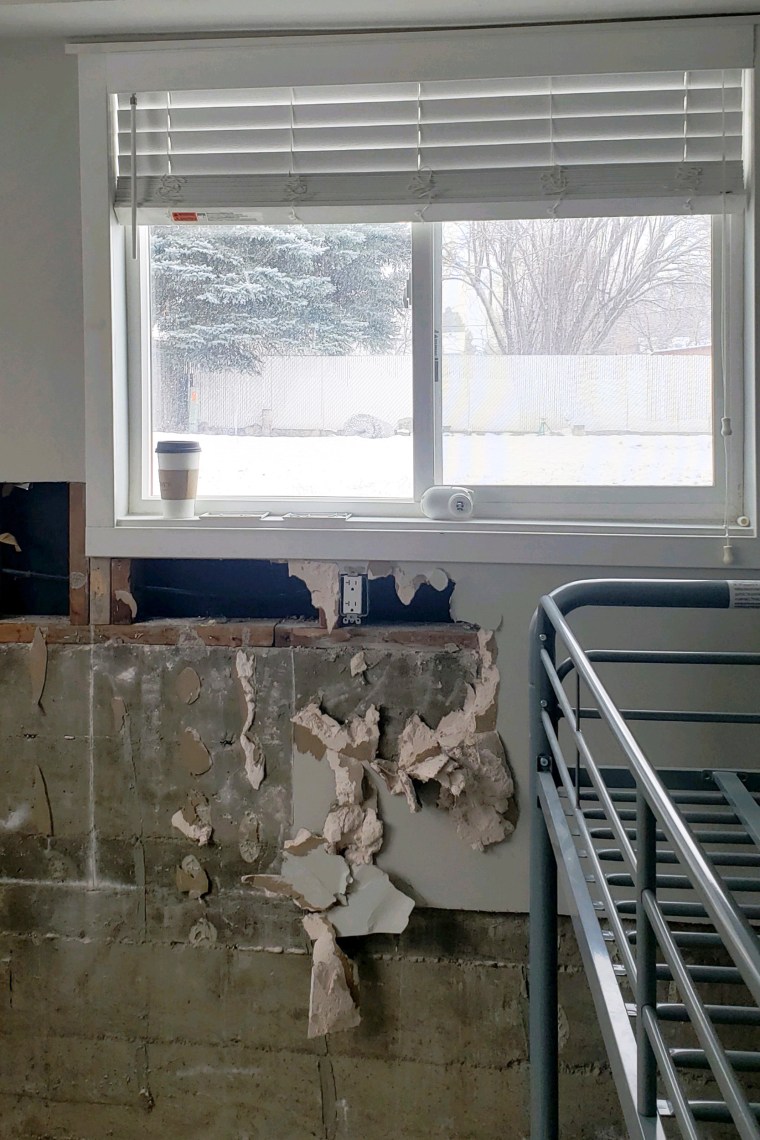A Utah family blames the children’s grief author Kouri Richins, who has been accused of fatally spiking her husband’s cocktail with fentanyl, for their near financial ruin since buying from her a remodeled house that they say they’ve had to evacuate because of “hazardous” levels of mold and an onslaught of mysterious medical problems.
“There was no trying to right any of the wrongs that she had thrown at us,” Taryn Wright, 38, told “Dateline” in her first interview about her lawsuit against Richins. “We’re just innocent bystanders in her path of destruction.”
“Hazardous” levels of mold in the home Alec and Taryn Wright bought three years ago from Richins’ realty company has left them teetering on the edge, struggling to pay the mortgage on a house they no longer live in, and barely able to cover rent on the home they live in now, they told “Dateline.”
For more on Kouri Richins, tune into “Page Turner” tonight on Dateline at 10 p.m./9 p.m. CT.
The couple sued Richins and her realty company in November, roughly six months before she was charged with murder in the March 4, 2022, death of Eric Richins.
Richins’ lawyers have denied the murder allegation, saying in a court filing after her arrest that there was no substantial evidence to support the charges. After her husband’s death, Richins wrote the children’s book “Are You With Me?” about grief.

The Wrights’ civil lawsuit, filed in Utah’s Fourth Judicial District Court, alleges breach of contract and fraud. The complaint alleges Richins misrepresented important facts about the property’s habitability and value “recklessly and without regard for the truth.”
The bank manager and the stay-at-home mom want Richins to cover repairs on property damage that they say amounts to a complete loss, as well as damages for a range of illnesses that allegedly began after their family moved into the nearly 2,000-square-foot home in January 2020.
In a court filing earlier this year, lawyers for Richins denied the Wrights’ allegations. Her company, Richins Realty, made a “fulsome disclosure,” the filing says, adding that the home’s alleged defects could have been discovered through a “reasonable inspection by an ordinary prudent buyer.”
Richins’ lawyer handling the civil case declined to comment and referred a reporter to public filings in which they rejected the homeowners’ allegations.
Drowning in debt
The home, in Heber City, southeast of Salt Lake City, was part of a house-flipping business that Richins launched in 2019, prosecutors said in a June court filing.
Within a couple of years, the business was drowning in debt — Richins owed lenders $1.8 million by February 2022 — and prosecutors alleged that she engaged in “fraud, theft, forgery” and “deception” as her financial woes mounted, according to the filing.
More on Kouri Richins
Prosecutors alleged she was secretly using a fraudulent power of attorney to execute a $250,000 line of credit against the home of her husband, who ran a successful stone masonry business and whose house was premarital property, the filing says.
But the Heber City home was the first in her new business venture, according to prosecutors, and the man from whom she bought the house, Val Maynard, said he was thrilled when she offered $215,000 for it.
Maynard had lived in the house for years, he told “Dateline,” but was ready to sell after his wife died. Maynard knew it needed significant repairs, since there had been “lots of water damage,” he said. But Maynard said he was upfront with Richins about the work it needed, according to the lawsuit.
When Richins first visited the house, Maynard recalled, she seemed friendly and pleasant. She and a man whom Maynard believed to be a work crew foreman appeared unfazed by the home’s deteriorating condition.
‘They were not troubled at all about it,” he said.
After the sale, subcontractors began “gutting” the property — even though it didn’t appear that proper permits had been obtained for a complete remodel, according to a general contractor who lives across the street and provided a declaration included in the Wrights’ lawsuit.
A dream house?
The house went on the market in October 2019, and Taryn Wright said it was presented as though it was in “pristine” condition. Maynard said that it looked like it could have been featured on a home makeover show.
“It looked like a magical transformation,” he said.
An inspection found no problems, Taryn Wright said, who said they were told nothing about prior water damage or plumbing and roof issues. The couple bought the house the following January for $409,000.
“We envisioned having barbecues and hosting and just spending time with family and being able to look out at that beautiful view,” Taryn Wright said.

After the first rain that spring, they noticed a musty smell in the basement, Taryn Wright said.
In their son’s room, Taryn said they found mold on the wall behind a new dresser and a pool of water on the floor.
Even before the discovery, the Wrights said they had been struggling with a series of illnesses and health issues — asthma and protracted fungal infections, joint pain and brain fog. The lawsuit alleges the family had to get medical treatment after their contact with the mold.
“We were constantly going to the doctor,” Taryn Wright said. “There was never like, ‘Oh, this is what’s wrong with you. It’s just kind of like, ‘Oh well, you’ll just get over it.’”
“It was super, super hard,” she added.
Moving out
The couple repaired the moldy drywall and replaced windows that had not been properly installed, according to the lawsuit. But the mold reappeared, and a local siding company told them that the roof was their problem: There were holes in it, the sides were rotten and the soffit and fascia boards were falling apart, according to the lawsuit.
In August 2022, as the family was getting sicker and their home seemed to be deteriorating, Taryn Wright said they had the house inspected for mold. “Hazardous” levels of the fungus were discovered in the basement in the inspection, according to the lawsuit, and mold spores had spread throughout the home.
Testing conducted at the home last month found a variety of toxic mold levels that were “bad” but not the worst, said Gianni Rossini, an owner of Envirobiomics, the company that analyzed the samples.
Some samples in the company’s analysis, which the Wrights provided to “Dateline,” showed levels that were a hundredfold higher than normal.
Rossini said the samples don’t measure toxicity, although the more mold there is the more likely it is to potentially affect someone who comes into contact with it.
Christopher Bloom, a spokesman for the National Center for Healthy Housing, a nonprofit that provides assistance for people dealing with mold, said that researchers are still trying to understand how different types of the fungus affect humans.
“As with many allergens, certain molds can affect people in a variety of different ways, depending on the type of mold, the length of exposure, and a person’s body chemistry,” he said in an email. “To date, the federal government has set no specific standards or made specific recommendations regarding airborne concentrations of mold or spores.”
Source: | This article originally belongs to Nbcnews.com










